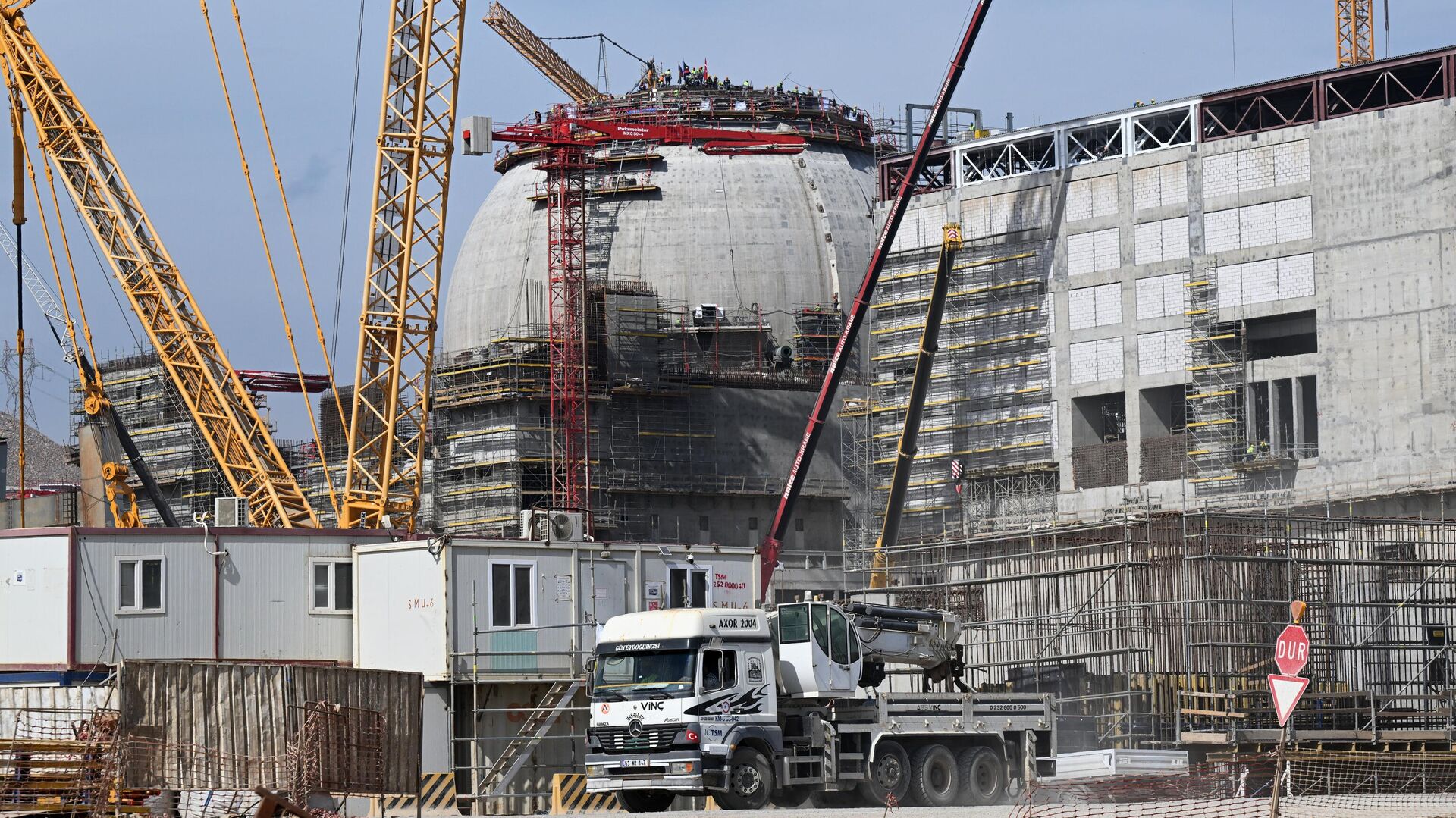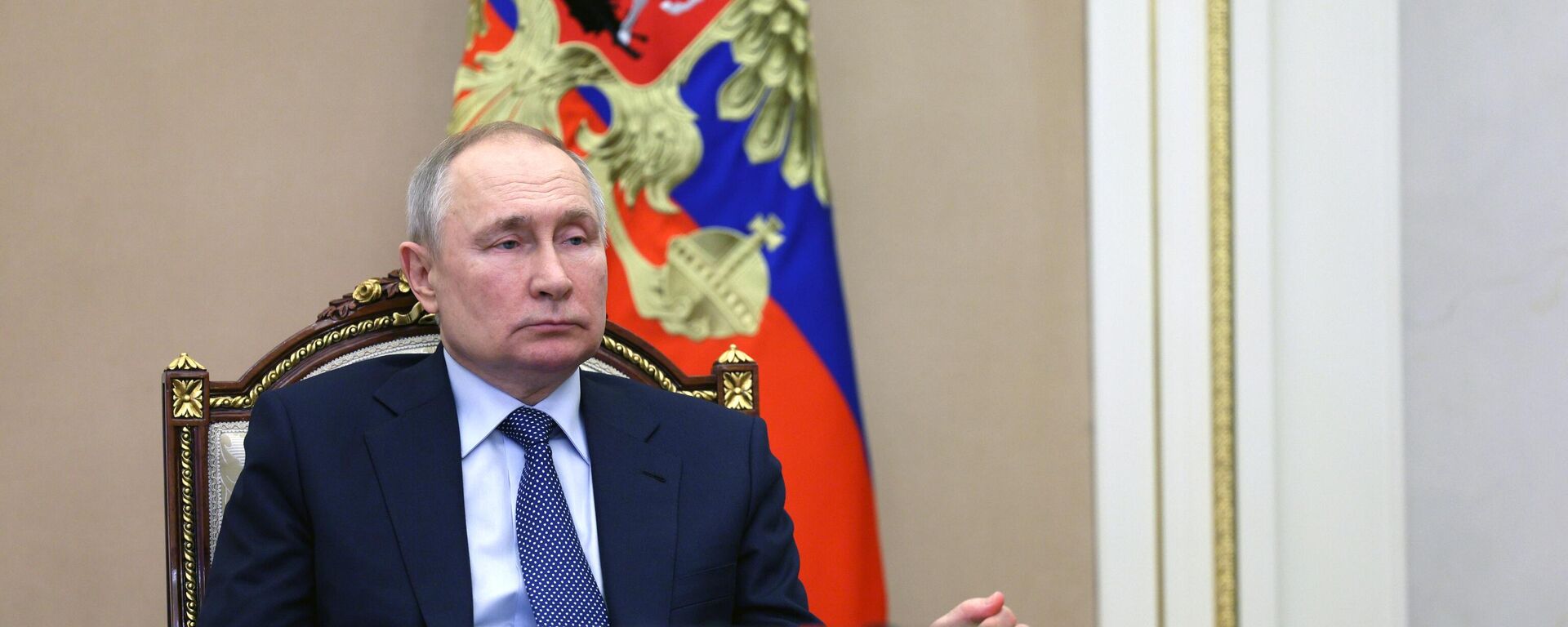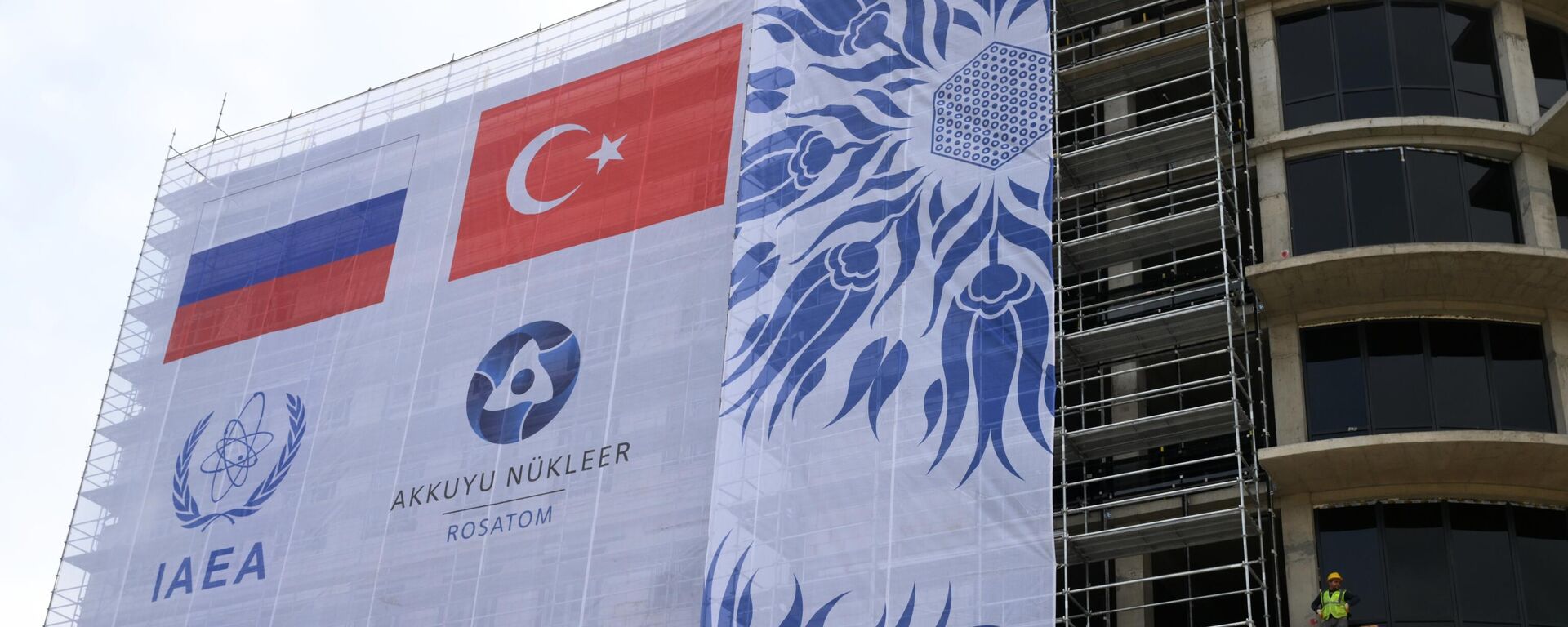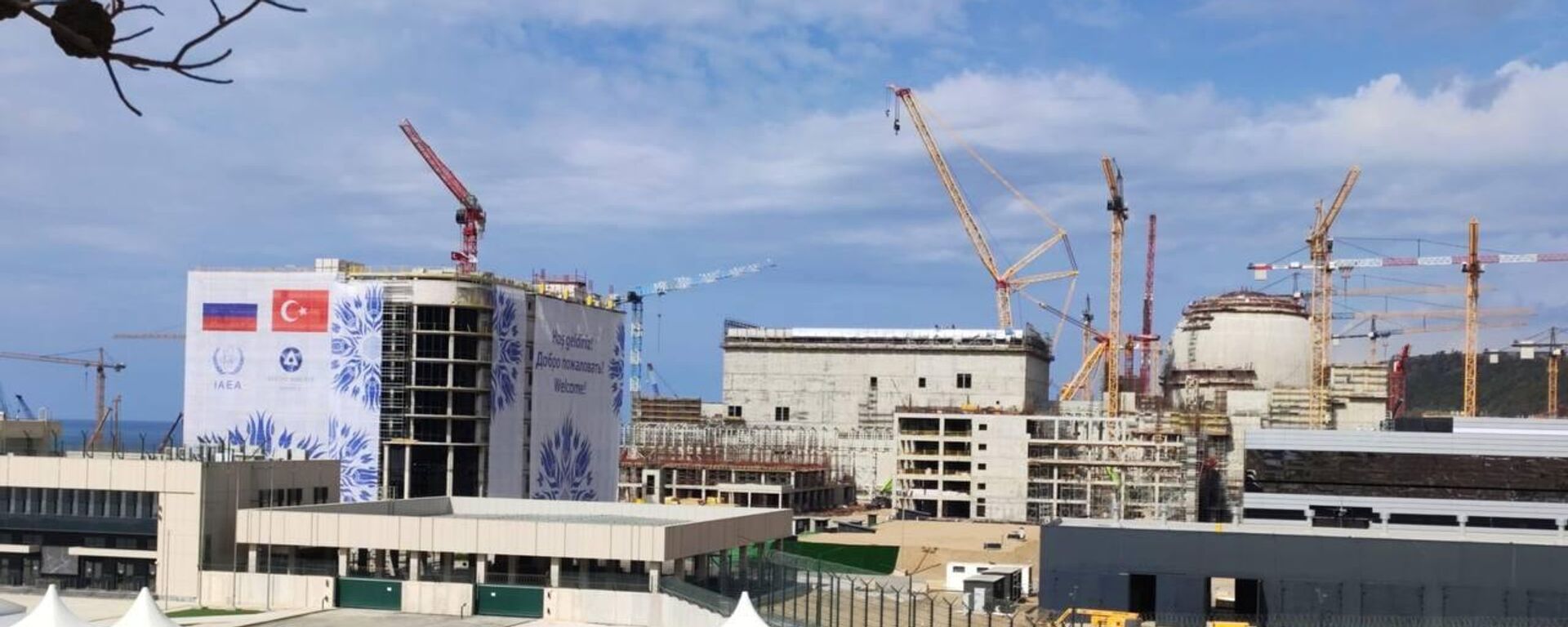https://sputnikglobe.com/20230427/atoms-for-ankara-akkuyu-npp-brings-turkiye-into-nuclear-club-1109896501.html
Atoms for Ankara: Akkuyu NPP Brings Turkiye Into Nuclear Club
Atoms for Ankara: Akkuyu NPP Brings Turkiye Into Nuclear Club
Sputnik International
President Putin joined his Turkish counterpart Recep Tayyip Erdogan on Thursday in a ceremony to inaugurate the Akkuyu Nuclear Power Plant featuring the loading of fuel into the plant’s first reactor. From the point of view of efficiency and energy security, Akkuyu will be invaluable to Ankara, energy experts Oleg Muratov and Alexei Anpilogov say.
2023-04-27T19:21+0000
2023-04-27T19:21+0000
2023-04-27T19:44+0000
analysis
akkuyu npp
akkuyu nuclear power plant
nuclear power
russia
turkiye
https://cdn1.img.sputnikglobe.com/img/07e7/04/1b/1109874190_0:160:3071:1887_1920x0_80_0_0_068c9d77f4fa484670ac999f4838a23f.jpg
Speaking at Thursday’s ceremony, President Putin hailed the Akkuyu NPP as a "flagship project" in Russian-Turkish ties, bringing "both mutual economic benefits, and certainly contribut[ing] to strengthening the multifaceted partnership between our two states, which is based on the principles of good neighborliness, mutual respect for and consideration of each other’s interests."President Erdogan, for his part, said the NPP will benefit Turkiye economically, and save Ankara upwards of $1.5 billion annually on natural gas imports.Built in the southern Turkish province of Mersin, the Akkuyu NPP project consists of four VVER-1200 nuclear reactors, and is the world’s first nuclear energy project built under the 'Build – Own – Operate' (or BOO) model, which tasks Russian state nuclear giant Rosatom with designing, building, maintaining, and operating the plant during its lifetime, and decommissioning and disassembling it once it has completed its lifecycle.Akkuyu has a total estimated cost of about $20-$22 billion, with the plant’s construction financed by the Russian state, and Ankara guaranteeing the purchase of part of the electricity it generates according to a $12.35 average fixed price-per-kilowatt scheme (not adjusted for inflation) for power from each of the reactors as they come online over a 15-year period."This is an important step for Turkiye," says Oleg Muratov, a member of the Public Council of Rosatom, commenting on Thursday’s ceremony.For Russia, Muratov says, the Akkuyu NPP means enduring cooperation with its neighbor across the Black Sea, as well as the export of its nuclear technology, construction services, and the long-term supply of nuclear fuel.Alexei Anpilogov, an energy expert and head of the Osnovanie Research Center, concurs, saying that in terms of energy security and economic benefits, Turkiye has hit the jackpot by landing the Akkuyu NPP project with Russia."It's necessary to understand the state of energy in the Turkish Republic. In very simple parameters, it can be described in comparison with the energy system of the Russian Federation. Russia, which has a population of about 150 million people, has an installed energy system capacity of 245 gigawatts. Turkiye, by comparison, which currently has a population about 88 million (more than half of Russia’s population) has an installed energy system capacity of only 95 gigawatts – that is, 2.5 times less than Russia. At the same time, it's necessary to understand that Turkiye is an industrialized country with a fairly high percentage of the population living in urban areas. As a result, the country faces energy shortages," Anpilogov explained.The observer noted that once it is fully operational, Akkuyu will be able to provide Turkiye with about 10 percent of its energy needs.Today, the expert pointed out, Turkiye has already begun negotiations on the construction of a second NPP – the Sinop plant in the country’s northern Black Sea-bordering province of Sinop, and Russia has a very good chance of winning the contract. “Because the former participants of the tender, including Hitachi, Westinghouse and Toshiba are constantly revising their proposals, increasing the construction costs and viewing very skeptically the format [of cooperation] that Turkiye needs, and which is present at the Akkuyu plant.”"Thus, for Turkiye [Akkuyu] is actually a kind of black box that produces electricity, for which Rosatom bears full responsibility, from design work and construction, to the disposal of the spent plant after the end of its service life," Anpilogov said.Rosatom's Global ReachCommenting on Western countries’ efforts to put pressure on Russia’s nuclear energy sector, Muratov said it will be difficult for nations to reject what Russia has to offer in this field, because the country not only accounts for a good chunk of global enriched uranium exports (including to the United States) but also controls about 40 percent of the world's enrichment capabilities.The expert pointed out that along with the project in Turkiye, Russia is building a four-reactor NPP in Egypt, planning construction of two reactors in Hungary, and two more in Bangladesh, while expanding nuclear energy cooperation with China and India, and bolstering this collaborative potential by providing the fuel that goes along with the reactors .Anpilogov agrees, noting that the geography of Rosatom’s activities goes far beyond the wealthy Western Organization for Economic Cooperation and Development (OECD) nations."Rosatom right now has a package of agreements on the construction of nuclear power plants that surpasses the combined project loads of all of its competitors [including] Westinghouse, Toshiba and the French company Areva, which is now called Orano," Anpilogov said. For these and other reasons –including the VVER-1200 reactors' efficiency compared with foreign competitors, the observer said he is "quite optimistic" about the future of Rosatom’s potential in foreign markets.For more of Anpilogov's analysis on the significance of Russian-Turkish cooperation on the Akkuyu NPP, check out our Telegram post here.
https://sputnikglobe.com/20230427/putin-joins-fuel-delivery-ceremony-for-turkiyes-akkuyu-nuclear-plant-via-video-link-1109871706.html
https://sputnikglobe.com/20230427/striving-for-akkuyu-browse-through-turkiyes-quest-for-nuclear-energy-1109875761.html
https://sputnikglobe.com/20230427/building-akkuyu-how-russia-helped-turkiye-power-its-nuclear-heart-1109871071.html
https://sputnikglobe.com/20220720/welcome-to-nuclear-club-how-russias-rosatom-helps-egypt-fulfill-its-technological-dream-1097623991.html
russia
turkiye
Sputnik International
feedback@sputniknews.com
+74956456601
MIA „Rosiya Segodnya“
2023
News
en_EN
Sputnik International
feedback@sputniknews.com
+74956456601
MIA „Rosiya Segodnya“
Sputnik International
feedback@sputniknews.com
+74956456601
MIA „Rosiya Segodnya“
nuclear power, plant, energy, turkiye, russia
nuclear power, plant, energy, turkiye, russia
Atoms for Ankara: Akkuyu NPP Brings Turkiye Into Nuclear Club
19:21 GMT 27.04.2023 (Updated: 19:44 GMT 27.04.2023) President Putin joined his Turkish counterpart Recep Tayyip Erdogan on Thursday in a ceremony inaugurating the Akkuyu Nuclear Power Plant featuring the loading of fuel into the plant’s first reactor. From the perspective of efficiency and energy security, Akkuyu will prove invaluable to Ankara, say energy experts Oleg Muratov and Alexei Anpilogov.
Speaking at Thursday’s ceremony, President Putin
hailed the Akkuyu NPP as a "flagship project" in Russian-Turkish ties, bringing "both mutual economic benefits, and certainly contribut[ing] to strengthening the multifaceted partnership between our two states, which is based on the principles of good neighborliness, mutual respect for and consideration of each other’s interests."
President Erdogan, for his part, said the NPP will benefit Turkiye economically, and save Ankara upwards of
$1.5 billion annually on natural gas imports.
Built in the southern Turkish province of Mersin, the Akkuyu NPP project consists of four VVER-1200 nuclear reactors, and is the world’s first nuclear energy project built under the
'Build – Own – Operate' (or BOO) model, which tasks Russian state nuclear giant Rosatom with designing, building, maintaining, and operating the plant during its lifetime, and decommissioning and disassembling it once it has completed its lifecycle.
Akkuyu has a total estimated cost of about $20-$22 billion, with the plant’s construction financed by the Russian state, and Ankara guaranteeing the purchase of part of the electricity it generates according to a $12.35 average fixed price-per-kilowatt scheme (not adjusted for inflation) for power from each of the reactors as they come online over a 15-year period.
"This is an important step for Turkiye," says Oleg Muratov, a member of the Public Council of Rosatom, commenting on Thursday’s ceremony.
"The country not only did not have such power plants, but didn’t have research reactors, and in general no reactors of any kind before this," Muratov told Sputnik in an interview. Akkuyu has effectively given Turkiye the keys to the the nuclear club, he said, and over time, the opportunity to cut down on hydrocarbon imports, and enjoy nuclear energy, which is clean energy.
For Russia, Muratov says, the Akkuyu NPP means enduring cooperation with its neighbor across the Black Sea, as well as the export of its nuclear technology, construction services, and the long-term supply of nuclear fuel.
"The service life of the VVER 1200 reactors being built there is 60 years, with the possibility of extension. That means that three generations [of Turks] will live as these power units operate. That means jobs. Furthermore, there may be additional uses for radiation technology, including the production of isotopes for things like food decontamination, the production of pharmaceuticals, nuclear medicine. So nuclear technology greatly increases the number of possible innovative technologies and applications. In addition, of course, Turkish specialists will be trained…Technological cooperation will develop in the field of education," the expert said.
Alexei Anpilogov, an energy expert and head of the Osnovanie Research Center, concurs, saying that in terms of energy security and economic benefits, Turkiye has hit the jackpot by landing the Akkuyu NPP project with Russia.
"It's necessary to understand the state of energy in the Turkish Republic. In very simple parameters, it can be described in comparison with the energy system of the Russian Federation. Russia, which has a population of about 150 million people, has an installed energy system capacity of 245 gigawatts. Turkiye, by comparison, which currently has a population about 88 million (more than half of Russia’s population) has an installed energy system capacity of only 95 gigawatts – that is, 2.5 times less than Russia. At the same time, it's necessary to understand that Turkiye is an industrialized country with a fairly high percentage of the population living in urban areas. As a result, the country faces energy shortages," Anpilogov explained.
The observer noted that once it is fully operational, Akkuyu will be able to provide Turkiye with about 10 percent of its energy needs.
"Strategic cooperation with Rosatom was a response to the challenge facing the Turkish energy system. This was a challenge that could not be resolved using any traditional means. It’s worth recalling that Turkiye does not have its own significant oil and gas fields, except those discovered in the Black Sea basin over the last few years....The country has very modest reserves of coal…And the same is true with alternative, or green energy. In Turkiye, the hydrological system and the potential of Turkish rivers has already been almost completely tapped, even causing friction with its neighbors, Iraq and Syria, into which the Tigris and Euphrates rivers flow. And notwithstanding fairly good potential for solar and wind power…the potential for renewables needs to be supported by some kind of base generation. This is exactly the answer provided by carbon-neutral nuclear power – the path that Turkiye has chosen to build a powerful and balanced energy system in the future," Anpilogov stressed.
Today, the expert pointed out, Turkiye has already begun negotiations on the construction of a second NPP – the Sinop plant in the country’s northern Black Sea-bordering province of Sinop, and Russia has a very good chance of winning the contract. “Because the former participants of the tender, including Hitachi, Westinghouse and Toshiba are constantly revising their proposals, increasing the construction costs and viewing very skeptically the format [of cooperation] that Turkiye needs, and which is present at the Akkuyu plant.”
"Thus, for Turkiye [Akkuyu] is actually a kind of black box that produces electricity, for which Rosatom bears full responsibility, from design work and construction, to the disposal of the spent plant after the end of its service life," Anpilogov said.
Commenting on Western countries’ efforts to put pressure on Russia’s nuclear energy sector, Muratov said it will be difficult for nations to reject what Russia has to offer in this field, because the country not only accounts for a good chunk of global enriched uranium exports (
including to the United States) but also controls about 40 percent of the world's enrichment capabilities.
The expert pointed out that along with the project in Turkiye, Russia is building a four-reactor NPP in Egypt, planning construction of two reactors in Hungary, and two more in Bangladesh, while expanding nuclear energy cooperation with China and India, and bolstering this collaborative potential by providing the fuel that goes along with the reactors .
Anpilogov agrees, noting that the geography of Rosatom’s activities goes far beyond the wealthy Western Organization for Economic Cooperation and Development (OECD) nations.
"Rosatom right now has a package of agreements on the construction of nuclear power plants that surpasses the combined project loads of all of its competitors [including] Westinghouse, Toshiba and the French company Areva, which is now called Orano," Anpilogov said. For these and other reasons –including the VVER-1200 reactors' efficiency compared with foreign competitors, the observer said he is "quite optimistic" about the future of Rosatom’s potential in foreign markets.
For more of Anpilogov's analysis on the significance of Russian-Turkish cooperation on the Akkuyu NPP, check out our Telegram post
here.








